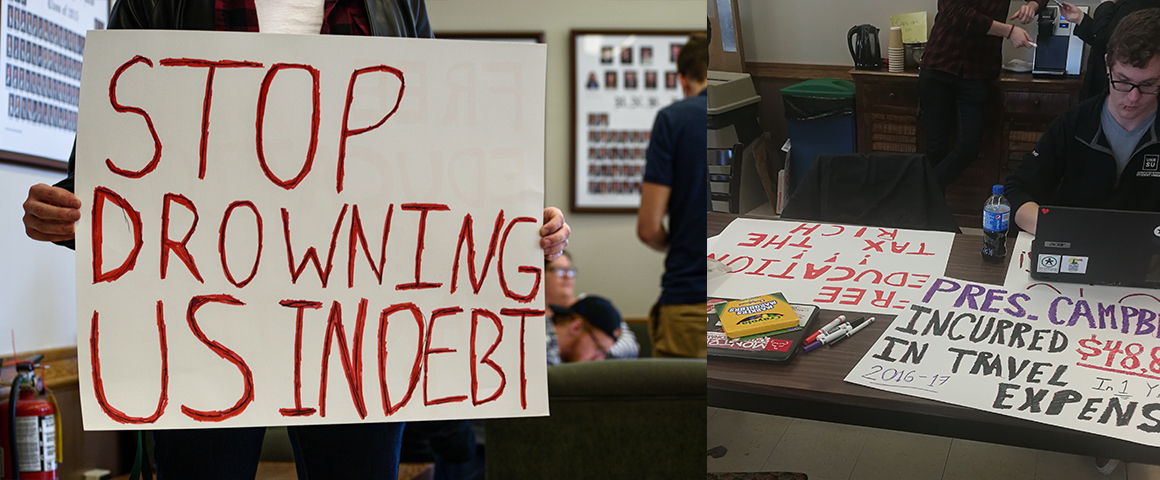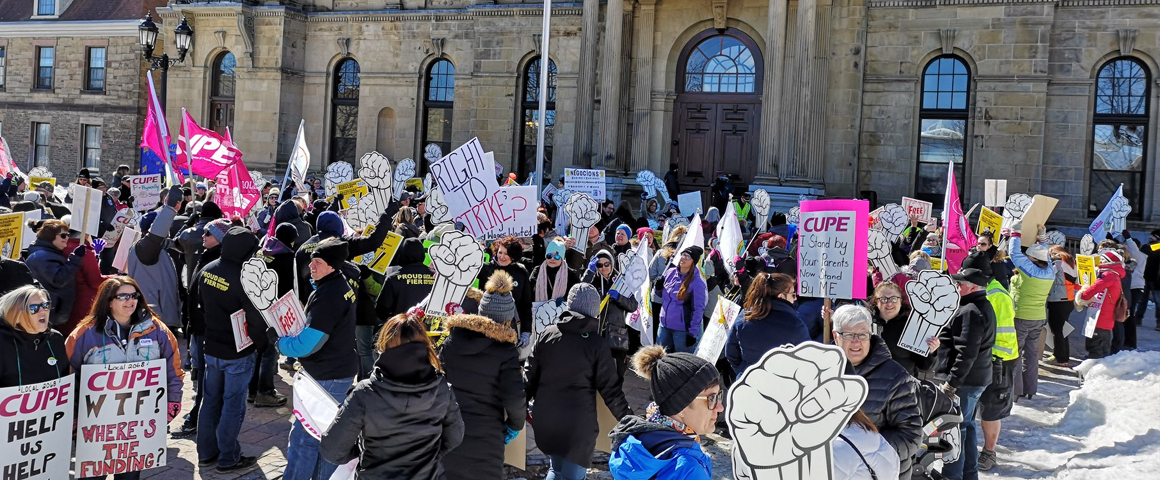Armed with protest signs, students on the Fredericton campus of the University of New Brunswick packed the university Senate’s meeting on March 27, to sit in on Vice-President Academic George MacLean’s presentation on massive increases being proposed as a “tuition reset” to the Board of Governors in May.
Over one hundred students stood through the four-hour meeting, until agenda item 14, the Vice President’s presentation. After the presentation, student senators lent their speaking rights to elected representatives of the Student Union, who read statements condemning the increase. Several senators echoed student criticisms.
Student Union executive member Chris McGinn tabled a motion for Senate to condemn the increase and to suggest to the Board of Governors that the vote on adopting the differential fee model be delayed till October, in line with the Student Union’s position. The motion passed Senate 25 to 10 with one abstention.
While a symbolic victory, students hope that the motion, as well as further actions, will put pressure on the Board to delay the vote. The Student Union hopes this will make the proposed increases a provincial election issue, giving them an opportunity to lobby political parties to develop new post-secondary policies which would drive down tuition.

It is unprecedented in Canadian history for a University administration to propose such steep hikes in a single increase. The Faculty of Law, for example, is getting a net increase of 50%, the Renaissance College leadership program and Nursing 22.4%. Similar rates apply to the faculties of Business and Engineering. The Arts and Science faculties will receive a lower 7% increase, still large in real terms.
While these increases would only affect newly-enrolled students, many current students are outraged by the proposal, as well as by the administration’s deceptive claim to have “consulted” students and by the wider social ramifications.
Law students in particular are angered that increasing the cost of attending UNB to almost $20,000 per year, in the country’s poorest province, will effectively class out the majority of New Brunswickers from practicing the law. In the long term, the Law Students Society worries this will promote an increase in elitism in the law profession, and a disconnection of the legal system from the needs and struggles of most New Brunswickers.
Students in other faculties have similar complaints.
“They’re robbing students to pay for their own debts” said Emily McMillan, Nursing representative for the UNB Student Union. “This 22.4% increase they want for future students going into nursing… it isn’t going to better the program that we have. (Future students) are paying more for a program that isn’t getting better.”
“We have an amazing program. But, I don’t feel comfortable sitting as a representative of students in Nursing, knowing that incoming students will be paying 22.4% more than me for the same program, solely to pay off debts the University has put itself in.”
McMillan feels the increase is particularly unfair to aspiring nurses:
“Targeting nursing is a low blow. We’re such an easy target because they know even if they increase tuition by, say, one hundred percent, they’re still going to have the same number of bodies in those seats because people want to be nurses and nursing is such a waitlisted program.”
Perry Dykens, Arts representative for the Student Union, described the increases as “infuriating”.
“I’ve spoken to my fellow Arts students and we have two major issues with this from the Arts perspective: The first is that we don’t see how this proposal is going to have any benefit to the future students. There’s been no talk about using these new funds for our faculties, there’s been no talk about it coming back to us at all. The other major concern is that by creating this tiered tuition system, its creating a value proposition which says that an Arts degree, or a general Science degree, is worth less than an Engineering degree.”
Dykens also expressed skepticism of the administration’s claim that increases were necessary to balance the university deficit:
“I’ve been here for two degrees, almost ten years, and every year my tuition has continuously gone up. It concerns me that they’re constantly raising tuition but they’re still incurring this structural debt. Why are they misappropriating our money so badly that even with constant increases, they haven’t fixed this deficit yet?”
Jacob Patterson, a member of the Young Communist League and a student at St. Thomas University, attended the sign-making event and the rally in Senate in solidarity with UNB students.
“We have the resources to provide quality post-secondary education and training to every person in this country, it’s just the political will that’s missing. We can do it, and its been done. All over the world, right? We don’t need to stand for this (increase), and as the Quebec student movement showed us, we can fight it. Students have power to change policy in government at the highest levels. If the student movement fights back against these increases, then we can stop them.”
“We can’t just sit around anymore,” Patterson concluded.
Tuition fees in New Brunswick have increased 20% since 2010, and since 2001 university operating budgets country-wide have doubled. Eighty-five percent of that has gone to increasing the pay and benefits of the upper administration and tenured faculty. Since 1997, the federal government has cut the corporate tax rate in half, and the wages of university support staff have gone down. On the provincial side, despite the introduction of the “Free Tuition Program” for low-income families and the Tuition Relief for the Middle-Class grant, the province spends a net $20 million less on student assistance than it did prior to the introduction of these programs.
A source which preferred to remain anonymous claims to have evidence that the proposed “reset” is part of the Memorandum of Understanding that universities signed with the New Brunswick government earlier in the academic year. A similar tuition reset proposal is rumoured to be floated at the Universitie de Moncton, the province’s only francophone university, in the coming months.
According to the Canadian Federation of Students, a modest increase in the provincial corporate tax rate from 14% to 16% could pay the tuition of every student currently enrolled in New Brunswick.




